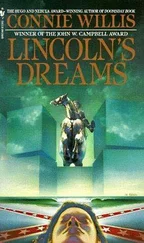Connie Willis - Bellwether
Здесь есть возможность читать онлайн «Connie Willis - Bellwether» весь текст электронной книги совершенно бесплатно (целиком полную версию без сокращений). В некоторых случаях можно слушать аудио, скачать через торрент в формате fb2 и присутствует краткое содержание. Год выпуска: 1996, ISBN: 1996, Издательство: Bantam Spectra, Жанр: Фантастика и фэнтези, на английском языке. Описание произведения, (предисловие) а так же отзывы посетителей доступны на портале библиотеки ЛибКат.
- Название:Bellwether
- Автор:
- Издательство:Bantam Spectra
- Жанр:
- Год:1996
- ISBN:0-553-37562-8
- Рейтинг книги:3 / 5. Голосов: 1
-
Избранное:Добавить в избранное
- Отзывы:
-
Ваша оценка:
- 60
- 1
- 2
- 3
- 4
- 5
Bellwether: краткое содержание, описание и аннотация
Предлагаем к чтению аннотацию, описание, краткое содержание или предисловие (зависит от того, что написал сам автор книги «Bellwether»). Если вы не нашли необходимую информацию о книге — напишите в комментариях, мы постараемся отыскать её.
Nominated for Nebula Award for Best Novel in 1998.
Bellwether — читать онлайн бесплатно полную книгу (весь текст) целиком
Ниже представлен текст книги, разбитый по страницам. Система сохранения места последней прочитанной страницы, позволяет с удобством читать онлайн бесплатно книгу «Bellwether», без необходимости каждый раз заново искать на чём Вы остановились. Поставьте закладку, и сможете в любой момент перейти на страницу, на которой закончили чтение.
Интервал:
Закладка:
And the more I fed in my data, the more convinced I was the answer wasn’t in it, that increased independence and lice and bicycling were nothing more than excuses, reasons thought up afterward to explain what no one understood. Especially me.
I wondered if I was even in the right field. I was feeling so dissatisfied, as if everything I was doing was pointless, so… itch.
Flip, I thought. She did this to me with her talk about Brine and Groupthink. She’s some kind of anti-guardian angel, following me everywhere, hindering rather than helping and putting me in a bad mood. And I’m not going to let her ruin my weekend. It’s bad enough she ruins the rest of the week.
I bought a piece of chocolate cheesecake and went back to the library and checked out The Red Badge of Courage, How Green Was My Valley, and The Color Purple, but the mood persisted throughout the steely afternoon, and all the icy way home, making it impossible for me to work.
I tried reading the chaos theory book I’d checked out, but it just made me more depressed. Chaotic systems had so many variables it would have been nearly impossible to predict the systems’ behavior if they acted in logical, straightforward ways. But they didn’t.
Every variable interacted with every other, colliding and connecting in unexpected ways, setting up iteration loops that fed into the system again and again, crisscrossing and connecting the variables so many ways it wasn’t surprising a butterfly could have a devastating effect. Or none at all.
I could see why Dr. O’Reilly had wanted to study a system with limited variables, but what was limited? According to the book, anything and everything was a variable: entropy, gravity, the quantum effects of an electron, or a star on the other side of the universe.
So even if Dr. O’Reilly was right and there weren’t any outside X factors operating on the system, there was no way to compute all the variables or even decide what they were.
It all bore an uncomfortable resemblance to fads and made me wonder which variables I wasn’t taking into account, so that when Billy Ray called, I clutched at him like a drowning man. “I’m so glad you called,” I said. “My research went faster than I thought it would, so I’m free after all. Where are you?”
“On my way to Bozeman,” he said. “When you said you were busy, I decided to skip the seminar and go pick up those Targhees I was looking at.” He paused, and I could hear the warning hum of his cell phone. “I’ll be back on Monday. How about dinner sometime next week?”
I wanted dinner tonight, I thought crabbily. “Great,” I said. “Call me when you get back.”
The hum crescendoed. “Sorry we missed each oth—” he said and went out of range.
I went and looked out the window at the sleet and then got into bed and read Led On by Fate cover to cover, which wasn’t much of a feat. It was only ninety-four pages long, and so obviously wretchedly written it was destined to become a huge fad.
Its premise was that everything was ordained and organized by guardian angels, and the heroine was given to saying things like “Everything happens for a reason, Derek! You broke off our engagement and slept with Edwina and were implicated in her death, and I turned to Paolo for comfort and went to Nepal with him so that we’d learn the meaning of suffering and despair, without which true love is meaningless. All of it—the train wreck, Lilith’s suicide, Halvard’s drug addiction, the stock market crash—it was all so we could be together. Oh, Derek, there’s a reason behind everything!”
Except, apparently, hair-bobbing. I woke up at three with Irene Castle and golf clubs dancing in my head. That happened to Henri Poincaré. He’d been working on mathematical functions for days and days, and one night he drank too much coffee (which probably had had the same effect as bad literature) and couldn’t sleep, and mathematical ideas “rose in crowds.”
And Friedrich Kekulé. He’d fallen into a reverie on top of a bus and seen chains of carbon atoms dancing wildly around. One of the chains had suddenly taken its tail in its mouth and formed a ring, and Kekulé had ended up discovering the benzene ring and revolutionizing organic chemistry.
All Irene Castle did with the golf clubs was the hesitation waltz, and after a while I turned on the light and opened Browning.
It turned out he had known Flip after all. He’d written a poem, “Soliloquy of the Spanish Cloister,” about her. “G-r-r, you swine,” he’d written, obviously after she crumpled up all his poems, and “There go, my heart’s abhorrence.” I decided to say it to Flip the next time she stuck me with the check.
Hot pants [1971]
Fashion fad worn by everyone that only looked good on the very young and shapely. A successor to the miniskirt of the sixties, hot pants were a reaction to fashion designers’ attempts to introduce the midcalf-length midiskirt. Hot pants were made out of satin or velvet, often with suspenders, and were worn with patent leather boots. Women wore them to the office, and they were even allowed in the Miss America pageant.
I spent the rest of the weekend ironing clippings and trying to decipher the simplified funding allocation form. What were Thrust Overlay Parameters? And my Efficiency Prioritization Ranking? And what did they mean by “List proprietary site bracket restrictions”? It made looking for the cause of hair-bobbing (or the source of the Nile) seem like a breeze in comparison.
Nobody else knew what EDI endorsements were either. When I went to work Monday, everybody I knew came up to the stats lab to ask about it.
“Do you have any idea how to fill this stupid funding form out?” Sarah asked, sticking her head in the door at mid-morning.
“Nope,” I said.
“What do you suppose an expense gradation index is?” She leaned against the door. “Do you ever feel like you should just give up and start over?”
Yes, I thought, looking at my computer screen. I had spent most of the morning reading clippings, extracting what I hoped was the relevant information from them, typing it onto a disk, and designing statistical programs to interpret it. Or what Billy Ray had referred to as “sticking it on the computer and pushing a button.”
I’d pushed the button, and surprise, surprise, there were no surprises. There was a correlation between the number of women in the workforce and the number of outraged references to hair-bobbing in the newspapers, an even stronger one between bobs and cigarette sales, and no correlation between the length of hair and the length of skirts, which I could have predicted. Skirts had dipped back to midcalf in 1926, while hair had gone steadily shorter all the way to the crash of ’29, with the boyish shingle in 1925 and the even shorter Eton crop in 1926.
The strongest correlation of all was to the cloche hat, thus giving support to the cart-before-the-horse theory and proving beyond a shadow of a doubt that statistics isn’t all that it’s cracked up to be.
“Lately I’ve been feeling depressed about the whole thing,” Sarah was saying. “I’ve always believed it was just a question of his having a higher relationship threshold than I do, but I’ve been thinking maybe this is just part of the denial structure that goes with codependent relationships.”
Ted, I thought. We’re talking about Ted, who doesn’t want to get married.
“And this weekend, I got to thinking, What’s the point? I’m following an intimacy path and he’s into off-road detachment.”
“Itch,” I said.
“What?”
“What you’re feeling,” I said. “Like you’re spinning your wheels on the launchpad. You didn’t run into Flip this weekend, did you?”
Читать дальшеИнтервал:
Закладка:
Похожие книги на «Bellwether»
Представляем Вашему вниманию похожие книги на «Bellwether» списком для выбора. Мы отобрали схожую по названию и смыслу литературу в надежде предоставить читателям больше вариантов отыскать новые, интересные, ещё непрочитанные произведения.
Обсуждение, отзывы о книге «Bellwether» и просто собственные мнения читателей. Оставьте ваши комментарии, напишите, что Вы думаете о произведении, его смысле или главных героях. Укажите что конкретно понравилось, а что нет, и почему Вы так считаете.












